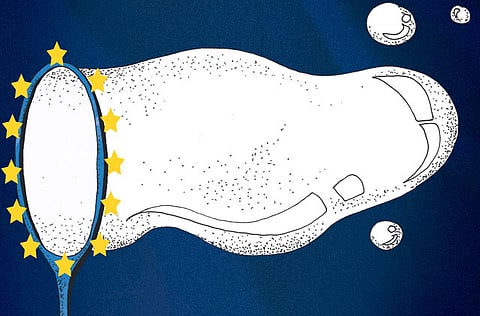Enough talk, EU needs to act
Europe pays lip service to the Palestinian cause while co-operating with Israel

With Baroness Catherine Ashton, the Eur-opean Union's High Representative for Foreign Affairs and Security and First Vice President of the European Commission to the Middle East, having just completed her visit, it's a good time to re-examine the position taken by the Union, whether in theory or in practice. We acknowledge that the EU is generally supportive of the Palestinian people politically and economically; in fact, it is a major donor of financial aid to the Palestinians. But in principle, as long as the EU adheres to its political and human values, we expect to see its support of the Palestinians reflected in concrete actions.
On the eve of Ashton's first visit to the region, the EU demanded that Israel work to revive peace negotiations with the Palestinians. In fact, Ashton herself declared that the EU can use its strong commercial relations with Israel as leverage to push it to resume negotiations. She believes that the EU can play a greater role, saying, "We're a huge supplier of aid and development in that region. We are strong with Israel in terms of trade and Israel wants to enhance its relationship with us, it wants to upgrade relations. Our ambition is that they know that the solution lies in a negotiated settlement. Our view is that it needs to happen quickly and now, with the opportunity that that affords Israel ... to be able to enhance the relationships it wants with us in any event for the future."
The Israeli-European relationship covers all econ-omic, political and cultural aspects; in fact, Israel-EU trade exceeds Israel's trade with the US. More than 40 per cent of Israeli foreign trade is with the EU. In 2005, trade with the EU reached 23 billion euros (Dh114.2 billion). In addition, Israel is the only non-European country that participates in the EU's scientific research programmes. It played an integral part in developing and financing the Galileo satellite navigation system that makes each EU country independent of the American GPS system. With regard to the scientific and technical co-operation agreements between the EU and Israel, the latter "was the first non-European country that was associated to the European Community's Framework Programme for Research and Technical Development (RTD). Israel's special status is the result of its very high level of scientific competence and the dense network of longstanding relations in scientific and technical co-operation between Israel and the EU. Israel first entered the 4th Framework programme in August 1996." On March 8, 1999, "the second Agreement for Scientific and Technical Co-operation between the European Community and Israel associating Israel to ‘FP5' [the fifth Framework programme for Community RTD] — 1999-2002" was signed.
Although the European countries have always criticised Israel's policies, they dare not take any action against it, apart from boycotting goods produced in the West Bank colonies. Indeed, the EU dismissed a Swedish recommendation that it recognise occupied East Jerusalem as the capital of the Palestinian State. The EU instead passed a resolution that recognised occupied Jerusalem as a capital for two states to be agreed upon through a negotiation process between both parties. This is despite most European countries' recognition that East Jerusalem is an occupied territory whose status should not be tampered with by Israel. Recently, a report by the Centre for European Studies said that, "regarding the Israeli-Palestinian peace process, the official stand of the European Union is to the effect that achieving a perpetual peace in the region is vitally important for Europe. The Middle East is a neighbouring region that has longstanding political, historical, cultural, economic and commercial relations with Europe, with its stability and security mutually dependent with that of Europe. For this reason, the European community and its member states are fully committed to playing a proper role in this process."
Unrealised potential
The EU is highly qualified to play that "proper role" in the international arena, although it has not lived up to its potential, and still deals with the Palestinian problem in a restrained manner. Indeed, Europe is the largest financial donor to the Palestinians, especially in repairing the destruction caused by Israel in its continuous assaults against the Palestinian people. The Europeans, as stipulated by their agreements with Israel, are the ones who provide funds to support the Palestinian National Authority and to enable it to pay its salaries. This economic reason and the assumption that Europeans are sincere in their compassionate stance on the sufferings and hopes of the Palestinians, as well as in their condemnation of the Israeli actions in occupied Jerusalem and the West Bank in general, should be enough to promote a more active role for the EU. But in spite of its political declarations regarding occupied Jerusalem, the colonies and the siege against Gaza, the lack of action to support these declarations undermines the EU. Until action is taken against Israel to convince it to respect the resolutions of the international community, the EU's statements will remain only lip service and an exercise in futility.
Will Europe's support for Palestinians remain in the realm of theory, contrasted with political, economic and technological co-operation with Israel, or will it be reflected by actions that are more likely to serve the values and principles adopted by the Union?
(Professor As'ad Abdul Rahman is the chairman of the Palestinian Encyclopaedia)


